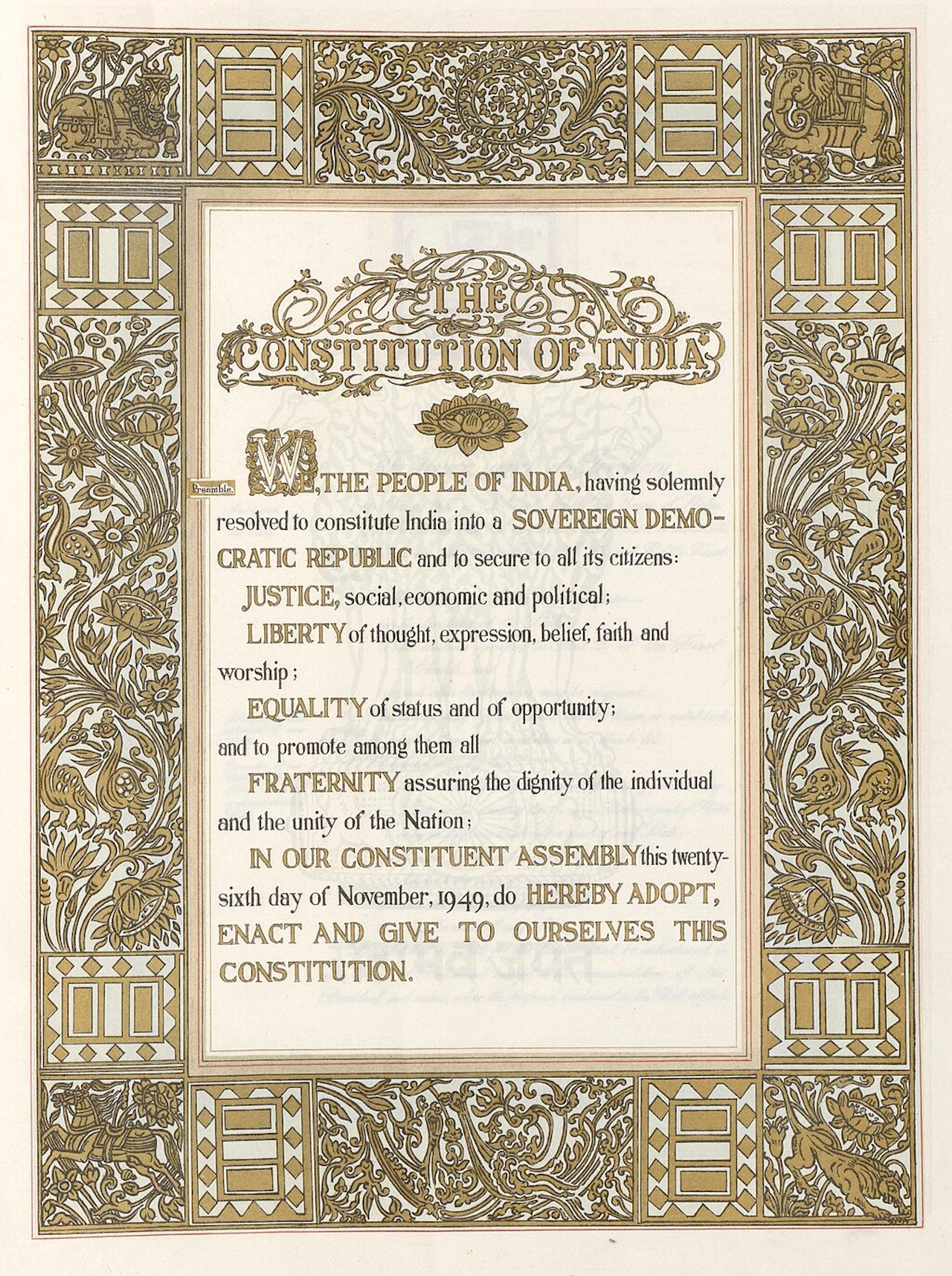
The study of India’s history necessarily confronts the question what is India and what does it mean to be Indian? The Constitution of India begins with “WE, THE PEOPLE OF”—tracing to The Constitution of the United States, the phrase drawing a distinction between WE, THE PEOPLE and INDIA. The linking preposition OF relating INDIA is more than a geography, in so far as it concerns THE PEOPLE, and more accurately a ground of being.1
(1) India, that is Bharat, shall be a Union of States.
(2) The States and the territories thereof shall be as specified in the First Schedule.
(3) The territory of India shall comprise—(a) the territories of the States;
The Constitution of India (1949), Page 1
(b) the Union territories specified in the First Schedule; and. (c) such other territories as may be acquired.
If the word INDIA is taken as a proper name: “a word that answers the purpose of showing what thing it is that we are talking about but not of telling anything about it (Mills 36),” then INDIA refers in the broadest sense to a body politic.
5. Citizenship at the commencement of the Constitution.—At the commencement of this Constitution, every person who has his domicile in the territory of India and—
(a) who was born in the territory of India; or
The Constitution of India (1949), Page 4
(b) either of whose parents was born in the territory of India; or (c) who has been ordinarily resident in the territory of India for not less than five years immediately preceding such commencement, shall be a citizen of India.
If as a corollary, the word Indian is taken as a proper adjective: “an adjective, typically capitalized, derived from a proper noun,” then this still leaves unanswered what does it mean to be Indian. Because if the proper adjective depends from a proper noun: “a noun that designates a particular being or thing,” then the proper adjective cannot convey more than what the proper adjective inherits from the proper noun. The proper adjective can only convey a beginning in the “thing it is.” The relationship between the proper adjective and the proper noun suggesting each Indian constitutes an India unto themself. So whereas initially, the word India defines the word Indian, the word Indian reflects back on the word India, and redefines the word India to comprise the sum of all Indians.2 There are in this sense as many Indias as there are Indians.
Trying to reconcile the many connotations of the words India—past and present, leads to the word India refers to a history that precedes दाशराज्ञ युद्ध, dāśarājñá yuddhá: “The Battle of the Ten Kings” and succeeds The Discovery of India. Where India, the “thing it is,” begins is impossible to determine. Because India, like the Indus river, has many beginnings and none—India, that is Bharat is a thing-in-process.
FOOTNOTES
- [Brahman is that] from which the origin etc., [i.e. the origin, sustenance and dissolution] of this [world proceed](Sri Swami Sivananda 18). ↩︎
- For she [India] is part of them in her greatness as well as her failings, and they are mirrored in those deep eyes of hers that have seen so much of life’s passion and joy and folly, and looked down into wisdom’s well (Nehru 646-647). ↩︎
BIBLIOGRAPHY
- Mill, John Stuart. “Of Names.” A System of Logic, Ratiocinative and Inductive, Lincoln-Rembrandt, 1874, pp. 29-44.
- Nehru, Jawaharlal. “Epilogue.” The Discovery of India. India, Meridian Books, 1946, pp 646-650.
- Ambedkar, Bhimrao Ramji. “The Constitution of India (Original Calligraphed and Illuminated Version).” edited by Constituent Assembly of India, 1949.
- Sri Swami Sivananda. “Samanvaya Adhyaya.” Brahma Sutras vol. 1, The Sivananda Publication League, 1949, pp. 15-82.
- “proper adjective.” Merriam-Webster’s Collegiate Dictionary, Eleventh Edition, Merriam-Webster Incorporated, 2004, p. 996.
- “proper noun.” Merriam-Webster’s Collegiate Dictionary, Eleventh Edition, Merriam-Webster Incorporated, 2004, p. 996.
